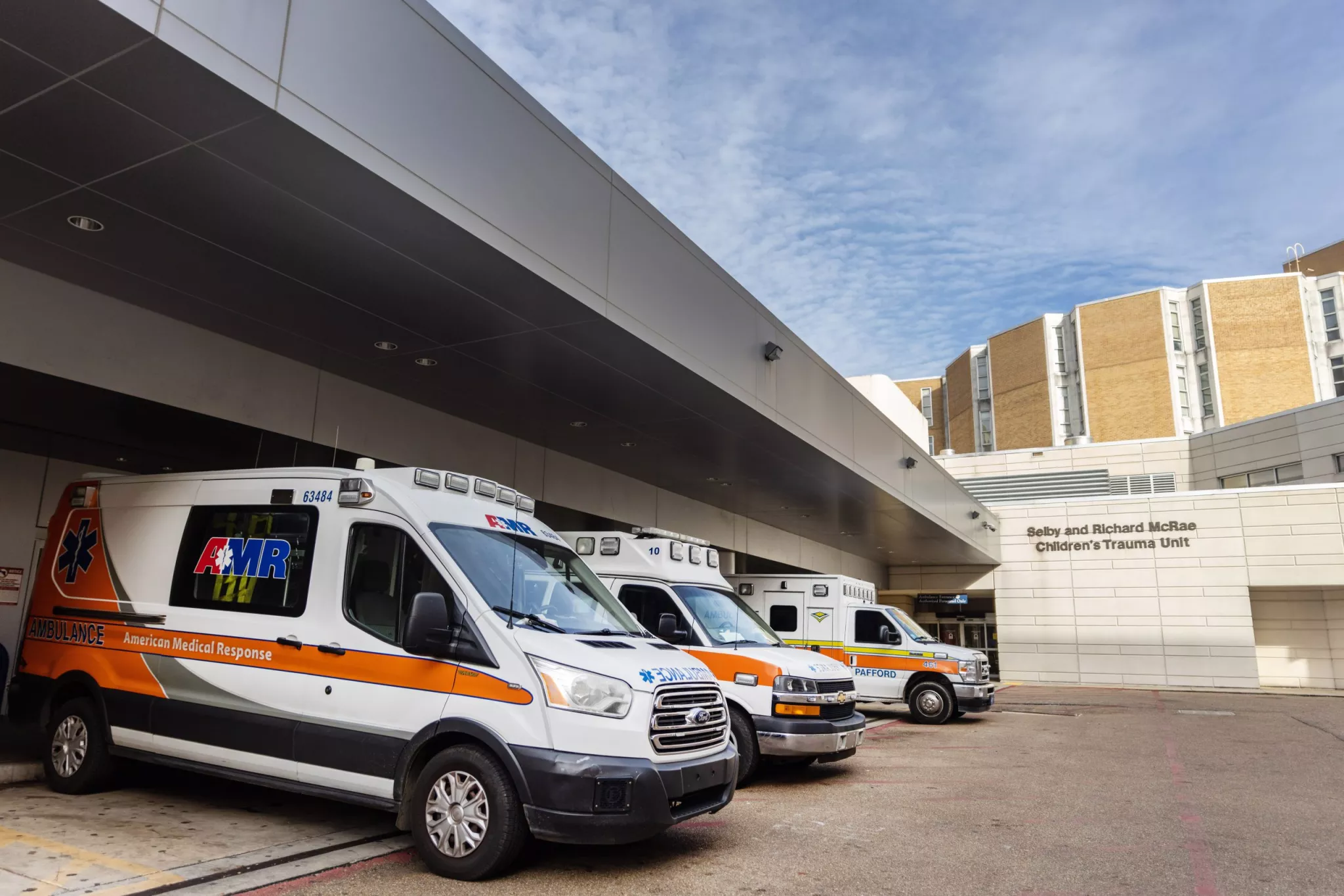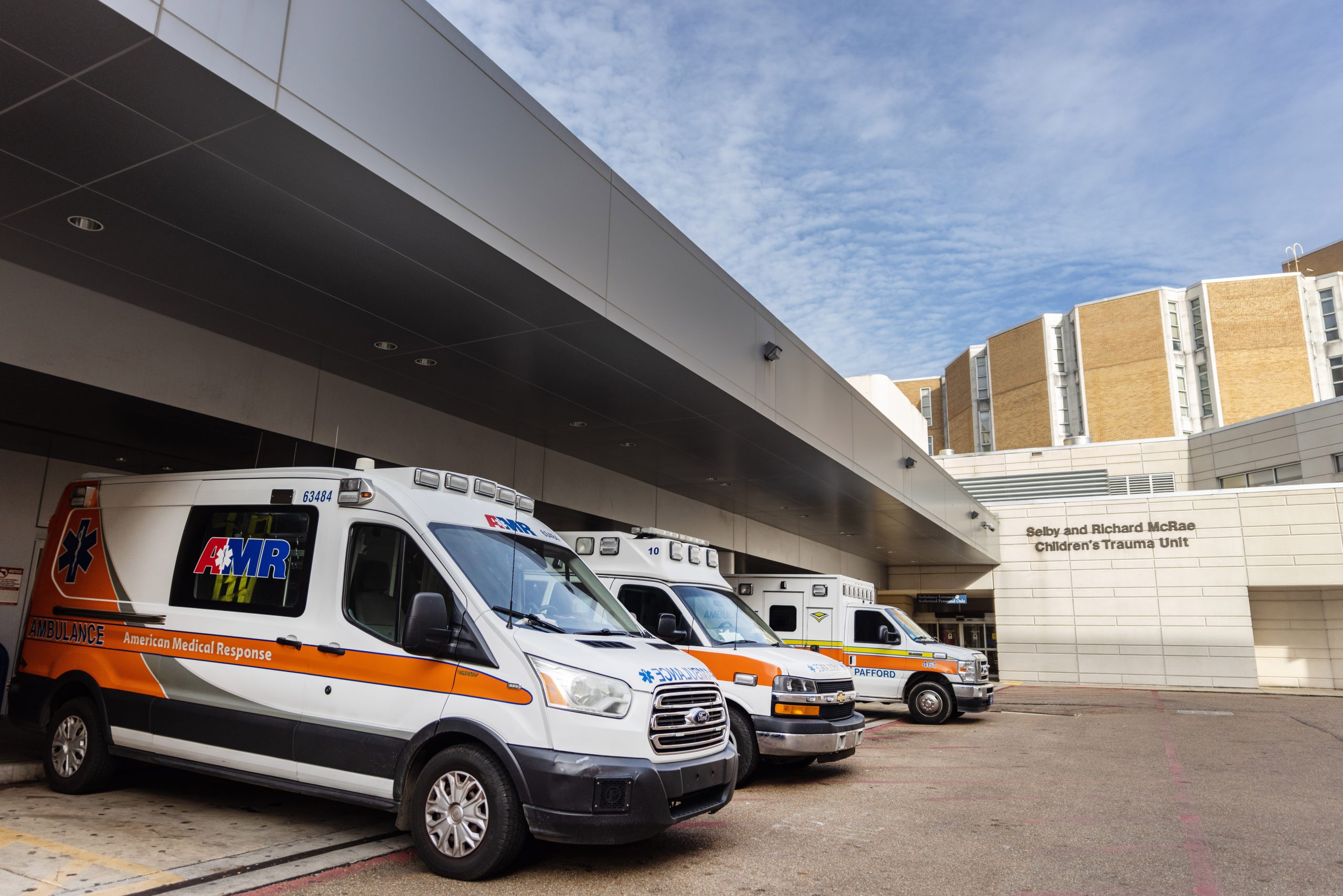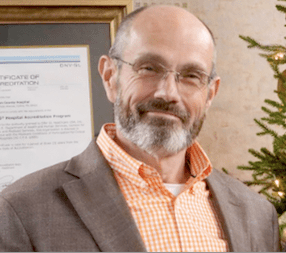Mississippi Today
Mississippi ambulance providers anticipate downfall of services amid hospital crisis


Mississippi ambulance providers fear a collapse of emergency medical services is on the horizon, partly as a result of hospitals discontinuing services and, in some cases, closing.
The crisis has caused a decline in worker availability for ambulance providers and an increase in emergency service wait times, those in the field say. And with the rise of medical costs and stagnant reimbursement rates, finances are also a challenge.
“Everything is working together and is causing this downward spiral of the whole system,” Clyde Deschamp, emergency medical service director for Mississippi Health Care Alliance, an organization aimed at coordinating medical activities within the state’s EMS districts, said. “It’s one big cycle.”
Hospital closures across the state are not only jeopardizing residents’ access to medical care but increasing interfacility transports – the transport of patients between two health care facilities.
Emergency services personnel are transporting patients longer distances due to rural hospitals no longer offering as many services. Patients now have to travel farther to get the care they need.
He said to make matters worse, once the ambulance arrives at the receiving hospital, the crew may be required to wait up to six hours in the emergency room due to bed shortages before transferring care to the hospital.
This “wall time” – the length of time emergency medical technicians and paramedics are waiting with patients before admission – prevents ambulance crews from responding to additional 911 calls, sometimes leaving a county area undercovered and residents with no assistance.
“Some of the more complicated transports won’t take just one paramedic but two. So, the problem with being stuck on the wall now is you have two people stuck waiting instead of one,” Deschamp said.

Despite the demand for workers, fewer people are pursuing this career.
According to a recent National Association of Emergency Medical Technicians report, most agencies nationwide reported increasing turnover rates on average from 8% in 2019 to 11% in 2022.
In addition, the report found from 2019 to 2022, nearly 66% of agencies experienced a decrease in job applications.
Deschamp said existing paramedics have stepped up as much as they can to fill staffing gaps, making it common for paramedics to work 80-plus hours per week.
“Unfortunately, resource management – no matter how good – simply cannot compensate for a lack of paramedics to staff ambulances and a growing demand for interfacility transports,” Deschamp told Mississippi Today. “Regrettably, the situation may get worse before it gets better.”
Gregory M. Cole, EMS advisory committee member to the Mississippi Board of Health and former chief compliance officer at Covington County Hospital, said working with limited resources to provide service in an adverse environment “is killing the morale of EMS workers.”
Cole said paramedics are burning out.
“They are exhausted,” Cole explained. “If you take a man or woman that has worked a 16-hour shift after running 12 calls, then at midnight have them take a patient six hours away. That is not safe for the patient nor is it healthy for the crew.”
At Covington County Ambulance Service, there are currently 70 employed medics and nine ambulances covering Covington, Simpson and Magee County, a roughly 1,010-square-mile area.
The ambulance service received a total of 10,000 calls last year – 90% were non-emergency and less than 10% were emergency calls. Non-emergencies included sprains and noise complaints, while emergencies included falls, motor vehicle accidents and respiratory disorders.
The number of hospital-to-hospital transfers this year for Covington County Ambulance Service as of Sept. 7 was 1,214, an increase from 714 in 2021 and 1,261 in 2022.
The rate of patient transfers spiked for two reasons, said Todd Jones, director of EMS at Covington County Hospital. The first is staff shortages at the hospitals it serves; the second is the service added Magee General Hospital and Simpson General Hospital.
In addition, the reimbursement model for EMS services is a problem, Cole said.
Cole told Mississippi Today that EMS is reimbursed at a bundled rate – it is paid an overall sum for treating a patient instead of an individualized amount for different patients.
He explained that even if he spends 12 hours taking care of a patient and $1,300 worth of medication to treat them, he is still provided one amount by the Centers for Medicare & Medicaid Services (CMS). And it usually doesn’t cover the expenses to provide emergency medical services, he said.

Cole said the uninsured, underinsured and private insurances cover only a portion of cost.
“This is equivalent to someone going into Walmart, getting $100 worth of groceries, deciding to only pay for $25 of it but still walking out with the rest of the groceries,” Cole explained. “Walmart wouldn’t allow you to do that, but somehow it’s okay to do that in ambulance services.”
Cole said without adequate reimbursement, EMS providers cannot stay response ready, attract the amount of workers they want and retain employees.
David Grayson, president of Mississippians for Emergency Medical Services, the state’s largest trade organization for ambulance personnel in Mississippi, said health insurers reimbursement rates vary by insurance type.
Nationwide, almost half of EMS patients are covered by Medicare, according to a 2008 American Ambulance Association study. The study found Medicare reimbursement rates for ambulance services are six percent less than the national average cost per ambulance transport.
In addition, uninsured patients make up an average of 14 percent of ambulance transports. Ambulance services experience almost double the uncompensated care burden as US hospitals and physicians, the study said.
Twenty to 40 percent of EMS patients are covered by Medicaid, which pays “universally low” rates.
“The concern I have is, if our reimbursements continue to stay flat or have a slow increase while our costs are obviously going up at a steeper level, then there’s going to come a time where ambulances are not going to be available,” Grayson told Mississippi Today.
This article first appeared on Mississippi Today and is republished here under a Creative Commons license.
Mississippi Today
Speaker White wants Christmas tree projects bill included in special legislative session

House Speaker Jason White sent a terse letter to Lt. Gov. Delbert Hosemann on Thursday, saying House leaders are frustrated with Senate leaders refusing to discuss a “Christmas tree” bill spending millions on special projects across the state.
The letter signals the two Republican leaders remain far apart on setting an overall $7 billion state budget. Bickering between the GOP leaders led to a stalemate and lawmakers ending their regular 2025 session without setting a budget. Gov. Tate Reeves plans to call them back into special session before the new budget year starts July 1 to avoid a shutdown, but wants them to have a budget mostly worked out before he does so.
White’s letter to Hosemann, which contains words in all capital letters that are underlined and italicized, said that the House wants to spend cash reserves on projects for state agencies, local communities, universities, colleges, and the Mississippi Department of Transportation.
“We believe the Senate position to NOT fund any local infrastructure projects is unreasonable,” White wrote.
The speaker in his letter noted that he and Hosemann had a meeting with the governor on Tuesday. Reeves, according to the letter, advised the two legislative leaders that if they couldn’t reach an agreement on how to disburse the surplus money, referred to as capital expense money, they should not spend any of it on infrastructure.
A spokesperson for Hosemann said the lieutenant governor has not yet reviewed the letter, and he was out of the office on Thursday working with a state agency.
“He is attending Good Friday services today, and will address any correspondence after the celebration of Easter,” the spokesperson said.
Hosemann has recently said the Legislature should set an austere budget in light of federal spending cuts coming from the Trump administration, and because state lawmakers this year passed a measure to eliminate the state income tax, the source of nearly a third of the state’s operating revenue.
Lawmakers spend capital expense money for multiple purposes, but the bulk of it — typically $200 million to $400 million a year — goes toward local projects, known as the Christmas Tree bill. Lawmakers jockey for a share of the spending for their home districts, in a process that has been called a political spoils system — areas with the most powerful lawmakers often get the largest share, not areas with the most needs. Legislative leaders often use the projects bill as either a carrot or stick to garner votes from rank and file legislators on other issues.
A Mississippi Today investigation last year revealed House Ways and Means Chairman Trey Lamar, a Republican from Sentobia, has steered tens of millions of dollars in Christmas tree spending to his district, including money to rebuild a road that runs by his north Mississippi home, renovate a nearby private country club golf course and to rebuild a tiny cul-de-sac that runs by a home he has in Jackson.
There is little oversight on how these funds are spent, and there is no requirement that lawmakers disburse the money in an equal manner or based on communities’ needs.
In the past, lawmakers borrowed money for Christmas tree bills. But state coffers have been full in recent years largely from federal pandemic aid spending, so the state has been spending its excess cash. White in his letter said the state has “ample funds” for a special projects bill.
“We, in the House, would like to sit down and have an agreement with our Senate counterparts on state agency Capital Expenditure spending AND local projects spending,” White wrote. “It is extremely important to our agencies and local governments. The ball is in your court, and the House awaits your response.”
This article first appeared on Mississippi Today and is republished here under a Creative Commons Attribution-NoDerivatives 4.0 International License.
Mississippi Today
Advocate: Election is the chance for Jackson to finally launch in the spirit of Blue Origin

Editor’s note: This essay is part of Mississippi Today Ideas, a platform for thoughtful Mississippians to share fact-based ideas about our state’s past, present and future. You can read more about the section here.
As the world recently watched the successful return of Blue Origin’s historic all-women crew from space, Jackson stands grounded. The city is still grappling with problems that no rocket can solve.
But the spirit of that mission — unity, courage and collective effort — can be applied right here in our capital city. Instead of launching away, it is time to launch together toward a more just, functioning and thriving Jackson.
The upcoming mayoral runoff election on April 22 provides such an opportunity, not just for a new administration, but for a new mindset. This isn’t about endorsements. It’s about engagement.
It’s a moment for the people of Jackson and Hinds County to take a long, honest look at ourselves and ask if we have shown up for our city and worked with elected officials, instead of remaining at odds with them.
It is time to vote again — this time with deeper understanding and shared responsibility. Jackson is in crisis — and crisis won’t wait.
According to the U.S. Census projections, Jackson is the fastest-shrinking city in the United States, losing nearly 4,000 residents in a single year. That kind of loss isn’t just about numbers. It’s about hope, resources, and people’s decision to give up rather than dig in.
Add to that the long-standing issues: a crippled water system, public safety concerns, economic decline and a sense of division that often pits neighbor against neighbor, party against party and race against race.
Mayor Chokwe Antar Lumumba has led through these storms, facing criticism for his handling of the water crisis, staffing issues and infrastructure delays. But did officials from the city, the county and the state truly collaborate with him or did they stand at a distance, waiting to assign blame?
On the flip side, his runoff opponent, state Sen. John Horhn, who has served for more than three decades, is now seeking to lead the very city he has represented from the Capitol. Voters should examine his legislative record and ask whether he used his influence to help stabilize the administration or only to position himself for this moment.
Blaming politicians is easy. Building cities is hard. And yet that is exactly what’s needed. Jackson’s future will not be secured by a mayor alone. It will take so many of Jackson’s residents — voters, business owners, faith leaders, students, retirees, parents and young people — to move this city forward. That’s the liftoff we need.
It is time to imagine Jackson as a capital city where clean, safe drinking water flows to every home — not just after lawsuits or emergencies, but through proactive maintenance and funding from city, state and federal partnerships. The involvement of the U.S. Environmental Protection Agency in the effort to improve the water system gives the city leverage.
Public safety must be a guarantee and includes prevention, not just response, with funding for community-based violence interruption programs, trauma services, youth job programs and reentry support. Other cities have done this and it’s working.
Education and workforce development are real priorities, preparing young people not just for diplomas but for meaningful careers. That means investing in public schools and in partnerships with HBCUs, trade programs and businesses rooted right here.
Additionally, city services — from trash collection to pothole repair — must be reliable, transparent and equitable, regardless of zip code or income. Seamless governance is possible when everyone is at the table.
Yes, democracy works because people show up. Not just to vote once, but to attend city council meetings, serve on boards, hold leaders accountable and help shape decisions about where resources go.
This election isn’t just about who gets the title of mayor. It’s about whether Jackson gets another chance at becoming the capital city Mississippi deserves — a place that leads by example and doesn’t lag behind.
The successful Blue Origin mission didn’t happen by chance. It took coordinated effort, diverse expertise and belief in what was possible. The same is true for this city.
We are not launching into space. But we can launch a new era marked by cooperation over conflict, and by sustained civic action over short-term outrage.
On April 22, go vote. Vote not just for a person, but for a path forward because Jackson deserves liftoff. It starts with us.
Pauline Rogers is a longtime advocate for criminal justice reform and the founder of the RECH Foundation, an organization dedicated to supporting formerly incarcerated individuals as they reintegrate into society. She is a Transformative Justice Fellow through The OpEd Project Public Voices Fellowship.
This article first appeared on Mississippi Today and is republished here under a Creative Commons Attribution-NoDerivatives 4.0 International License.![]()
Mississippi Today
On this day in 1959, students marched for integrated schools

April 18, 1959

About 26,000 students took part in the Youth March for Integrated Schools in Washington, D.C. They heard speeches by Martin Luther King Jr., A. Phillip Randolph and NAACP leader Roy Wilkins.
In advance of the march, false accusations were made that Communists had infiltrated the group. In response, the civil rights leaders put out a statement: “The sponsors of the March have not invited Communists or communist organizations. Nor have they invited members of the Ku Klux Klan or the White Citizens’ Council. We do not want the participation of these groups, nor of individuals or other organizations holding similar views.”
After the march, a delegation of students went to present their demands to President Eisenhower, only to be told by his deputy assistant that “the president is just as anxious as they are to see an America where discrimination does not exist, where equality of opportunity is available to all.”
King praised the students, saying, “In your great movement to organize a march for integrated schools, you have awakened on hundreds of campuses throughout the land a new spirit of social inquiry to the benefit of all Americans.”
This article first appeared on Mississippi Today and is republished here under a Creative Commons Attribution-NoDerivatives 4.0 International License.![]()
-

 Mississippi Today6 days ago
Mississippi Today6 days agoOn this day in 1873, La. courthouse scene of racial carnage
-

 Mississippi Today6 days ago
Mississippi Today6 days agoLawmakers used to fail passing a budget over policy disagreement. This year, they failed over childish bickering.
-

 Local News7 days ago
Local News7 days agoAG Fitch and Children’s Advocacy Centers of Mississippi Announce Statewide Protocol for Child Abuse Response
-

 Local News6 days ago
Local News6 days agoSouthern Miss Professor Inducted into U.S. Hydrographer Hall of Fame
-

 News from the South - Alabama News Feed4 days ago
News from the South - Alabama News Feed4 days agoFoley man wins Race to the Finish as Kyle Larson gets first win of 2025 Xfinity Series at Bristol
-

 News from the South - North Carolina News Feed7 days ago
News from the South - North Carolina News Feed7 days agoHelene: Renewed focus on health of North Carolina streams | North Carolina
-

 News from the South - Alabama News Feed5 days ago
News from the South - Alabama News Feed5 days agoFederal appeals court upholds ruling against Alabama panhandling laws
-

 Our Mississippi Home7 days ago
Our Mississippi Home7 days agoFood Chain Drama | Our Mississippi Home


















































